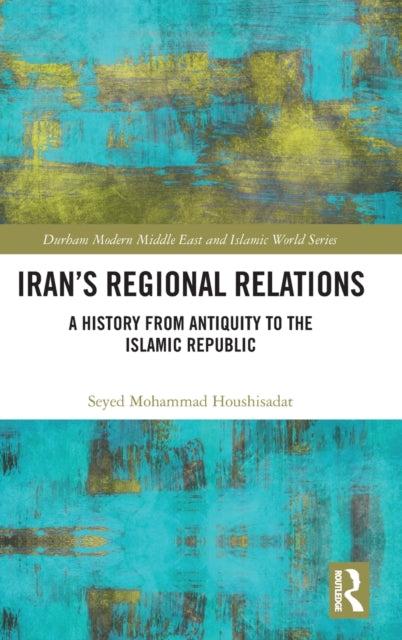Seyed Mohammad Houshisadat
Iran's Regional Relations: A History from Antiquity to the Islamic Republic
Iran's Regional Relations: A History from Antiquity to the Islamic Republic
YOU SAVE £7.20
- Condition: Brand new
- UK Delivery times: Usually arrives within 2 - 3 working days
- UK Shipping: Fee starts at £2.39. Subject to product weight & dimension
Bulk ordering. Want 15 or more copies? Get a personalised quote and bigger discounts. Learn more about bulk orders.
Couldn't load pickup availability
- More about Iran's Regional Relations: A History from Antiquity to the Islamic Republic
This book provides a comprehensive analytical and theoretical survey of Iranian foreign relations in the Middle East from Antiquity until the Islamic Republic,focusing on the interplay between domestic-level changes and region-wide interaction.
\n Format: Hardback
\n Length: 260 pages
\n Publication date: 06 October 2020
\n Publisher: Taylor & Francis Ltd
\n
This book delves into the intricate interplay between domestic-level changes and region-wide interactions, offering a comprehensive analytical and theoretical survey of Iranian foreign relations in the Middle East from antiquity to the Islamic Republic. Spanning a vast expanse of time, it charts the evolution of the Persian empire, including the Median kingdom and the Sassanid Empire, as well as the rule of various dynasties such as the Abbasids, Mongols, Safavids, and Qajars. It also explores the modern states of the Shah and the Islamic Republic. Throughout, the author reflects on the enduring factors that have shaped Iran's relations with the rest of the region, including geography, culture, policymaker belief systems, decision-making structures, and sub-regional systems. This comprehensive study provides a deep analysis of Iranian foreign relations over a remarkable 4,700 years.
Introduction:
Iran has a rich and complex history of foreign relations, spanning thousands of years. This book aims to provide a comprehensive analytical and theoretical survey of Iranian foreign relations in the Middle East from antiquity to the Islamic Republic. By examining the interplay between domestic-level changes and region-wide interactions, we can gain a deeper understanding of the factors that have shaped Iran's interactions with its neighbors and the broader world.
Persian Empire:
The Persian empire, which emerged in the 6th century BCE, was one of the largest and most influential empires in the ancient world. It encompassed a vast territory, including present-day Iran, Iraq, Afghanistan, and parts of Central Asia. The empire was characterized by its strong military power, sophisticated culture, and complex political structure.
During the reign of the Persian empire, Iran had close relations with many neighboring states, including Egypt, Greece, and Rome. These relations were marked by trade, cultural exchange, and political alliances. However, the empire also faced numerous challenges, including internal conflicts, territorial disputes, and the rise of rival powers such as the Greeks and the Romans.
As the empire declined in the 4th century CE, it was divided into several kingdoms, including the Sassanid Empire, which ruled Iran for several centuries. The Sassanids were known for their military prowess and their cultural achievements, including the development of Zoroastrianism, a religion that remains important in Iran today.
However, the Sassanid Empire also faced internal conflicts and external pressures, which led to its decline and eventual collapse in the 7th century CE. This period marked the beginning of a new era in Iranian history, with the rise of the Islamic Republic in 1979.
Islamic Republic:
The Islamic Republic of Iran was founded on the principles of Shi'ism, a branch of Islam that emphasizes the rule. The revolution that led to the establishment of the Islamic Republic was marked by a series of political and social reforms, including the abolition of the monarchy, the establishment of a theocracy, and the promotion of women's rights.
Since its establishment, the Islamic Republic has had a complex and often strained relationship with its neighbors, particularly the United States and Israel. These relations have been shaped by a variety of factors, including the Islamic Republic's support for terrorism, its nuclear program, and its regional ambitions.
The Islamic Republic has also sought to establish close relations with other countries in the Middle East, including Saudi Arabia, Egypt, and Turkey. These relations have been marked by a variety of challenges, including political differences, economic disputes, and regional conflicts.
In conclusion, this book provides a comprehensive analytical and theoretical survey of Iranian foreign relations in the Middle East from antiquity to the Islamic Republic. By examining the interplay between domestic-level changes and region-wide interactions, we can gain a deeper understanding of the factors that have shaped Iran's interactions with its neighbors and the broader world. The book highlights the enduring factors that have shaped Iran's relations with the rest of the region, including geography, culture, policymaker belief systems, decision-making structures, and sub-regional systems. Overall, this book provides a valuable resource for scholars, researchers, and policymakers interested in understanding the complex and multifaceted nature of Iranian foreign relations in the Middle East.
\n Weight: 584g\n
Dimension: 162 x 240 x 24 (mm)\n
ISBN-13: 9780367281458\n \n
This item can be found in:
UK and International shipping information
UK and International shipping information
UK Delivery and returns information:
- Delivery within 2 - 3 days when ordering in the UK.
- Shipping fee for UK customers from £2.39. Fully tracked shipping service available.
- Returns policy: Return within 30 days of receipt for full refund.
International deliveries:
Shulph Ink now ships to Australia, Belgium, Canada, France, Germany, Ireland, Italy, India, Luxembourg Saudi Arabia, Singapore, Spain, Netherlands, New Zealand, United Arab Emirates, United States of America.
- Delivery times: within 5 - 10 days for international orders.
- Shipping fee: charges vary for overseas orders. Only tracked services are available for most international orders. Some countries have untracked shipping options.
- Customs charges: If ordering to addresses outside the United Kingdom, you may or may not incur additional customs and duties fees during local delivery.


